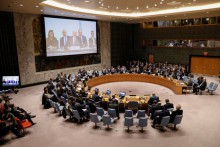After at least 70 people had died in a chemical attack in the Syrian district of Eastern Ghouta, particularly in the town of Douma, on April 7, the UN Security Council held an emergency session in New York on April 9.
The US ambassador to this organization, Nikki Haley, said Washington would retaliate to the suspected chemical attack by Syrian President Bashar al-Assad’s regime on its own citizens and added that Russia’s hands are “covered in the blood of Syrian children.” “History will record this as the moment when the Security Council either discharged its duty or demonstrated its utter and complete failure to protect the people of Syria. Either way, the United States will respond,” CNN quotes her as saying. Haley proposed putting to a vote a draft resolution on investigating chemical attacks in Syria.
At the same time, Russia’s permanent representative in the UN, Vasily Nebenzya, said that this document contains some “unacceptable elements,” the fact of a chemical attack is unconfirmed, and the incident was staged, DW reports.
Meanwhile, this incident triggered a harsh reaction of US President Donald Trump who condemned the “heinous attack on innocent Syrians with banned chemical weapons.” “We are meeting with our military…, and we’ll be making some major decisions over the next 24 to 48 hours. We are very concerned that a thing like that can happen. This is about humanity, and it can’t be allowed to happen. If it’s Russia, if it’s Syria, if it’s Iran, if it’s all of them together, we’ll figure it out, and we’ll know the answers quite soon. So we’re looking at that very, very strongly,” Trump said on April 9. When journalists asked him if Russian President Vladimir Putin bears responsibility for this, the White House chief said: “He may. And if he does, it’s going to be very tough.” Asked if US military action is off the table, he said that “nothing is off the table.”
“THE U.S. IS PREPARED TO BUILD UP PRESSURE ON ASSAD”
The Day requested Oleksandr BOHOMOLOV, president of the Center for Middle Eastern Studies, to say what steps Washington can be expected to take against President Bashar al-Assad’s regime in retaliation for the suspected chemical attack.
“As Trump has announced, a military option is being considered. The president said they have a lot of military variants of retaliation. I would expect the same action as it was last time – a US strike on Shayrat Airbase after a chemical attack on Khan Sheikhoun. But, in principle, the situation has changed, and we can expect some more decisive action. I think the US, as well as its allies, is prepared to build up pressure on Assad and his allies, Russia and Iran.
“Consequences are the main thing, for a military operation is by itself the means, not the goal. And the goal is to change the situation in Syria. The Assad regime and its allies are systematically using weapons of mass destruction. This must be put an end to. This troika – Russia, Syria, and Iran – must understand that what comes next is a real red line, not the purely rhetorical red line that existed during the presidency of Obama in the US.
“As for the US-proposed resolution on the mechanism of investigating chemical attacks in Syria, I think there will be a search for ways of action. Russia has vetoed over ten resolutions in all this period of time. In the past few years, Russia has made the UN Security Council unviable in respect of some key issues. Of course, UN mechanisms make it possible to bypass the Security Council. History know instances when the US and West European countries acted in a different way.
“And as for how to stop the Assad regime and Putin, who backs it, they must see that there is a line. Unfortunately, many chances have been missed before – first of all, due to an excessively peaceful attitude of the President Obama administration. The consequences of this policy are also part of the current problem. It was far easier to solve it before. Now it is more difficult, while there is a more pressing need to do something. If pressure tends to build up for some time, the solution may be found.”







